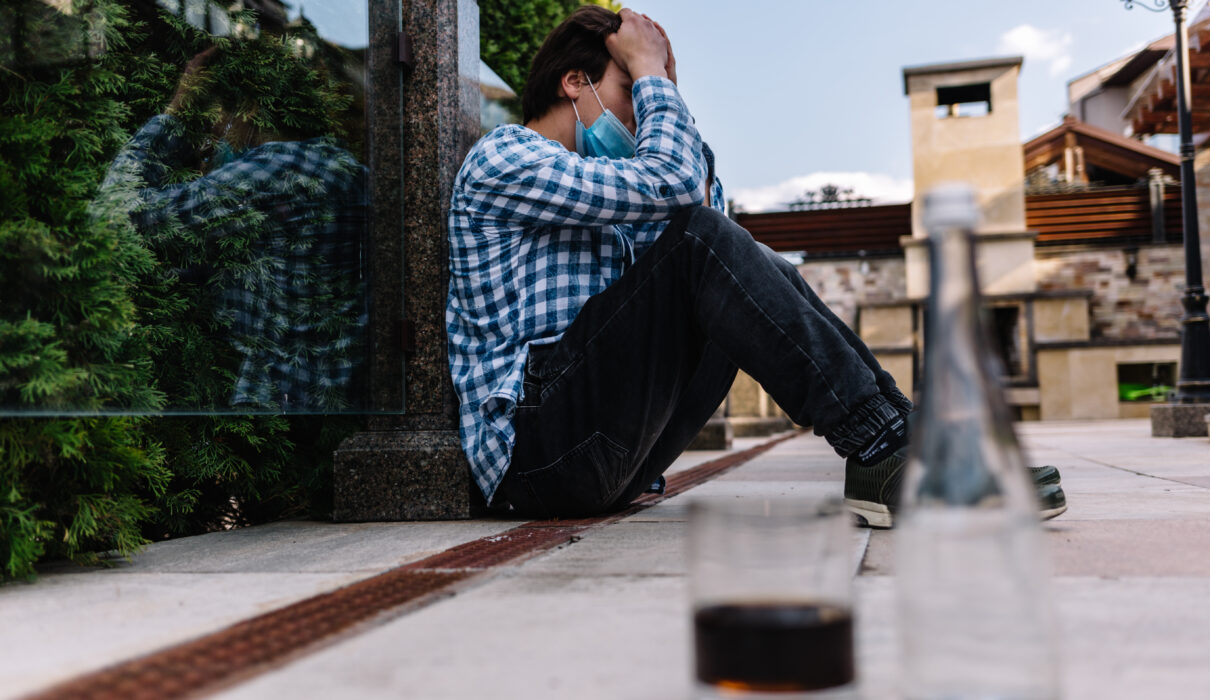Alcohol and depression unfortunately often go hand in hand. Here you can better understand how this complicated interaction feeds off of each other.
“Drowning one’s sorrows in alcohol” is an expression that very well defines the relationship between depression and alcoholism. Many people consume it when they are in a low mood, without knowing that it is a depressing drug. In other words, it causes a worsening of the emotional state, not to mention the serious consequences that its addiction has.
So what leads people to consume such drinks when they feel deeply sad? Can a depressed person become worse by developing a dependency on these substances or do they lead to depressive disorder? We will clear up these questions in the following paragraphs.
Why does alcohol consumption increase when there are depressive symptoms?
It is common for alcohol consumption to increase (or start) when symptoms of depression and anxiety appear . However, on paper this is paradoxical, since alcohol produces a depressing effect on the nervous system, which worsens the symptoms.
The key lies in the effect that the drink has in the hours immediately after its consumption: it produces chemical changes in the brain that generate a hedonic, relaxing and disinhibitory effect. Thanks to the fact that it promotes the release of neurotransmitters such as serotonin , endorphin or dopamine (among others), the subject experiences relief from their depressive symptoms.
In addition, the impact on the endocannabinoid system and the release of endorphins directly affects the brain’s reward system, thus promoting future consumption.
Despite this, a rebound effect occurs after 72 hours, which is when the presence of alcohol in the blood is released. At this time, symptoms such as sadness , restlessness, irritability or difficulty sleeping increase . Thus, there is a risk of drinking again, so that a feedback loop between alcohol and depression is created, which accelerates the deterioration of the individual’s health.
What comes first, depression or alcoholism?
Experts do not agree on this issue. Currently, each case is treated individually, as some people suffer from alcohol-induced depression or, on the other hand, their consumption is aggravated by a depressive condition.
The symptoms of depression and anxiety correlate with increased alcohol intake and also with alcohol consumption disorder . Let’s differentiate between the two scenarios.
Alcohol-induced major depression
Excessive and chronic consumption induces changes in the brain, such as serotonergic deficiency, which cause a persistent state of depression. As mentioned above, this in turn leads to continued consumption, aggravating symptoms and consolidating the feedback loop.
Alcohol consumption due to depression
The relationship between depression and drinking also starts from the other pole. Here, the patient acquires the habit of drinking to relieve his depressive symptoms. Over time, the habit worsens and a feedback loop is set in motion between both disorders, which worsens the symptoms.
Treatment for depression and alcoholism
Unfortunately, alcohol consumption during depression makes treatment difficult , as depression becomes resistant to psychotherapy . In general, the focus is on depressive symptoms to break the cycle of consumption, without forgetting the other therapeutic modalities.
The first-line approach includes antidepressants (especially selective serotonin reuptake inhibitors), treatment for alcoholism and psychological therapy. In therapeutic management, it will be very important to differentiate between depressive episodes induced by consumption and primary ones.
In the psychotherapeutic part, the cognitive-behavioral approach is usually used , which includes techniques for changing habits, emotional regulation and resources that improve mood without resorting to alcoholic substances. However, in recent years, emphasis has been placed on multimodal treatment, due to the high comorbidity between depression and alcoholism.
Is it possible to quit alcohol when you have depression?
Alcohol provides a simple and immediate “solution” to sadness, so it easily becomes the antidote to escape unpleasant emotions. This is the stumbling block, which makes it difficult to get liquor out of life when depression becomes deep or chronic.
However, if you are wondering about the possibility of quitting alcohol if you are depressed, the answer is yes if you approach it from a preventive point of view. At an individual level, some measures you can take to reduce consumption are as follows:
- Try new activities where alcohol is not a concern.
- Inform your loved ones of your intention to reduce (or stop) your intake. Ask them for support in achieving this.
- Take care of your diet, sleep and exercise. Physical health and mood are closely related.
- Keep track of how many alcoholic drinks you consume per day, per week and per month. With these numbers, you can begin to set limits to minimize the number.
- Calculating how much you spend on drinking and cutting back on purchases is a useful way to do this if you are motivated by saving money. You can invest the surplus money in healthy leisure activities.
Don’t hesitate to seek help
It is crucial to clarify one thing: addictions and depression are illnesses. Just as you cannot cure diabetes by reducing sugar in your diet, you would not be able to cure major depression by thinking positively and drinking to “forget.”
Therefore, if you see any sign that threatens your mental health, go to a professional. No one chooses to get sick and no one should heal alone.


